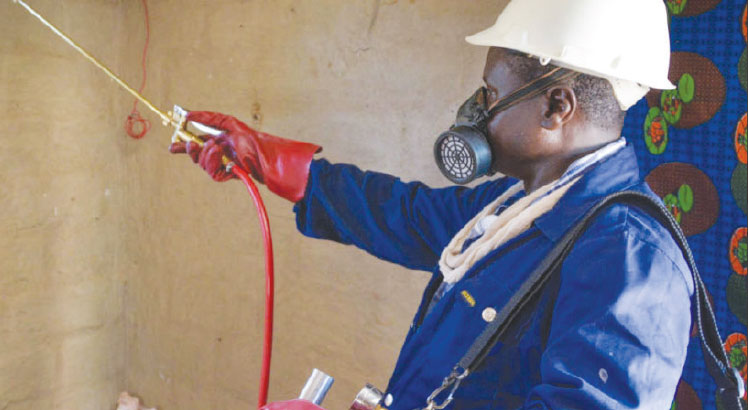Malaria remains a major killer in Malawi. The Ministry of Health reports that the disease transmitted by mosquito bites accounted for seven million cases, 36 percent of outpatients, in 2020.
The prevalence is high in lakeshore districts and in lowlands along major rivers, especially the Shire Valley.
In the prone districts of Nkhata Bay, Balaka and Mangochi, World Vision Malawi is supporting the Ministry of Health to spray chemicals that kill mosquitoes in the interior walls and roofs of houses.
IRS gets underway in Mangochi
Added weapon
The indoor residual spraying (IRS) project funded by the Global Fund seeks to reduce the malaria burden in line with the national strategy for integrated vector control.
This expands the country’s weapons against malaria spreaders.
For decades, the government has been distributing bed nets soaked in long-acting insecticides that repel mosquitoes and spraying chemicals that kill mosquito larvae in breeding grounds, especially stagnant water.
In Nkhata Bay, teams meet as early as 4.30am to share sites earmarked for spraying. They start spraying around 7am.
“The district is hilly and most target communities are far apart and hard to reach, so the earlier we start, the better,” says Tukombo site manager Clara Mkumbwa-Chirambo.
They start off early to get to people’s houses in time.
“We need to start at least two hours earlier since most of the areas are hard to reach,” explains Mkumbwa-Chirambo.
After spraying, no one is allowed to enter the house for two and a half hours.
Charles Chirwa, from Chiphika Village in Traditional Authority Zilakoma, feels lucky that his house was sprayed with anti-mosquito insecticides.
“Malaria was a huge menace in my household,” he says. “Two of my grandchildren have been battling with malaria since they returned from South Africa last month. I hope this chemical will stop malaria.”
Nkhata Bay District Council director of planning and development Isaac Mkandawire heads the district task force to end malaria.
He says for years, Nkhata Bay has been one of the districts topping the list of malaria incidence and prevalence in the country.
Figures from health facilities indicate that for every 10 000 people, 1 109 people were infected with malaria.
Halving malaria
But three years since the IRS programme started, the cases have dropped by half.
“We emphasise that members of the houses that have been sprayed should continue to sleep under nets treated with long-lasting insecticides because these interventions complement each other,” explains Mkandawire.
Other strategies to keep the disease in check include dispensing anti-malaria drugs to patients and draining stagnant pools where mosquitoes breed.
World Vision district IRS coordinator Trynomica Kalua says the teams armed with sprayers will reach 71 729 households in Nkhata Bay.
“Before we started the programme, malaria cases were high. Last year, we saw a reduction of half. We hope there will be further reductions when we finish spraying this year,” she says.
Kalua, however, lamented resistance, myths and misconceptions in some communities.
“Some people are very skeptical to accept the spraying programme due to various beliefs,” she says “We use different strategies to help them understand the importance of getting their homes sprayed.”
Among the strategies, the teams meet traditional leaders and other influencers a day before spraying. The community leaders mobilise heads of households and sensitise them to the importance of having their houses sprayed.
Secretary for Health Charles Mwansambo says the IRS project puts the country on the path to achieve the global goal to eliminate malaria by 2030.
Malawi is among 20 countries with the highest malaria prevalence and deaths.
In 2020, the nation accounted for 1.8 percent of cases and 1.1 percent of malaria deaths globally.
Between 2017 and 2020, the disease burden increased from 218 to 228 per 1 000 of the population at risk.
However, deaths fell slightly from 0.39 to 0.37 per 1 000 of the population.
Mwansambo attributed the decrease in deaths to the integrated vector control strategy underway.
Zero malaria goal
The government and its partners, including World Health Organisation, have also rolled out the malaria vaccine to reduce the burden.
Mwansambo states: “If you look at 2016 figures, we are at 23 deaths per 100 000 people and according to last year’s figures, we are at 12 deaths for every 100 000 people, but that is still significant.
“So, we want to eliminate malaria and that’s the purpose of the introduction of the vaccine. It supplements other efforts to achieving the 2030 malaria elimination goal.”
The post Sprayers hiss to end malaria appeared first on The Nation Online.
 Moni Malawi
Moni Malawi 
